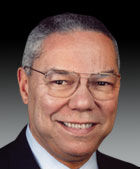 From the streets of Harlem to the Oval Office, General Colin Powell has met the challenges of leadership at every stage of his remarkable life. Today, he is one of the most admired public leaders in the world.
From the streets of Harlem to the Oval Office, General Colin Powell has met the challenges of leadership at every stage of his remarkable life. Today, he is one of the most admired public leaders in the world.
Colin Powell was the U.S. Secretary of State from 2001 to 2005 under President George W. Bush. Prior to that, he served as Chairman of the Joint Chiefs of Staff from 1989 to 1993, during which he oversaw the invasion of Panama and Operation Desert Storm. In 1997, Powell founded America’s Promise — The Alliance for Youth to improve the lives of children from all socioeconomic backgrounds. The author of the best-selling memoir, My American Journey, Powell speaks regularly on his improbable career arc and the leadership lessons he has learned along the way.
Notes from Bill Hybel’s interview of Colin Powell continue below.
Powell Principles
- Leaders should facilitate a clash of ideas… until the leader makes a decision and then enact it as if it was their own
- “Noisy System” He would do things to hide his position of authority and would argue with subordinates. He wants what you know.
- Only people get things done (not plans or charts). Leader has the responsibility to put the followers in a position to get the work done.
- Commander takes 1/3 of the time to prepare their plan, 1/3 to subordinate leaders to make their plans, 1/3 to train the troops
- Maintain an open door policy. Open to people inside the organizations. Also had trusted advisers outside the organization with direct access who would provide perspective.
- Probe the organization. Subordinate leaders (should) have nothing to worry about when their subordinates would go directly to Powell. Powell would go to those subordinate leaders to discuss the matter and then go back to the private. Seems to violate the chain of command, but issues get addressed within the chain of command.
- Reward your best performers. Get rid of non-performers. If nothing is done to address the poor performer it causes a loss of moral for the best performers.
- Be prepared to disappoint people and make people angry.
- Can you be liked and effective? Check your ego at the door. Don’t take it personally.
- Have fun when you’re in command. Fixed old cars. Unlike most of the things he did, there was a solution.
- Fit no stereotypes.
- Family gave 2 things – expectations and shame
- Perpetual optimism is a force multiplier. If the leader shows up every day and has thought through the problem and sees a way through, that optimism is effective (not false optimism or spin)
- Must create an environment of trust… goals clearly communicated… led by example
Award war if at all possible. Was criticized for ending the Gulf War before going to Baghdad. - How does leadership change on the battlefield? Time is compressed. Same processes of analysis but must be done much more quickly.
- Trust the element of instinct.
- Be prepared to be lonely. At the end of the day you’re the one who made the decision and you alone must stand for it.
- Powell became the confidant and engaged leaders under them.
- Church has the responsibility to educate the congregation about the issues and to go out into the world.
- He’s now working with youth
- All of us have a debt of service that we may never be able to repay.
What Powell Principles do you need to reflect on more? What do you need to get better at?
Colin Powell gave leaders a set of quick notes from which to glean nuggets of gold.
I had a hard time moving somel of his principles out of the military world to my real world. But other things were powerful reminders.
Force multipliers, things always look better in the morning, positive optimism. Great reminders to adopt as a way of work.